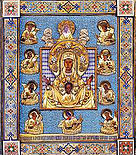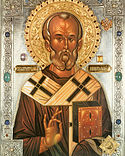Circumstances of the death of Br. Joseph Muñoz – an article by Bishop Andrei
During the time of the early Christians, martyrs were glorified in the Church by virtue of the very fact of martyrdom, and no other evidence of their holiness was required. The early Christians understood the great mystery of martyrdom. Martyrs, through their suffering for Christ, intimately unite with Him, the first Sufferer, and become vessels of God’s grace. As soon as someone was killed for his faith in Christ, he was venerated as a holy martyr, and his remains were reverently preserved as holy relics.
However, it should be noted that at that time, as a rule, it was self-evident that the martyr suffered for his faith in Christ, whereas in the case of new martyrs this is not always obvious. Therefore, it is very important to analyse the circumstances of Br. Joseph’s death in order to be convinced that the cause of his murder was none other than his church ministry, and thus he is undoubtedly a Holy Martyr.
The circumstances of Br. Joseph’s murder were investigated by a court in Athens in November 1998, and a report was published by Fr. Victor Potapov, who was present at the trial. (link).
The investigation did not find the killers, and no one was convicted of this crime. But what was established at the trial is enough to assert that the murder of Br. Joseph was a carefully planned operation, performed at the level of professionalism of the special services.
From an analysis of all the circumstances, it is clear that the organisers of the murder were spying on Br. Joseph and were aware of his plans. Brother Joseph knew that he was being followed. One of Br. Joseph’s friends reported that there was often a car in front of Br. Joseph’s house, and Br. Joseph noticed the same car in various places where he visited, both in Montreal and in other cities of Canada. Moreover, people who sat in the mysterious car in Montreal appeared in other cars, in other cities.
Greece was chosen as the place of the murder. It is clear that in Canada or the United States it would be much more difficult for murderers to cover their tracks. In Athens, Br. Joseph also continued to be watched, and as soon as his companion, Fr. Alexander Iwaszewicz, flew to Argentina, the plan was carried out the same evening.
A hotel room was found, which could be accessed through the balcony, from the roof of a neighbouring house. There were two or three killers who were waiting for their victim in this room. A young Romanian was found, who was assigned the task to lure Br. Joseph to the place of murder and to give false testimony against him. This young man, in order to lure Br. Joseph to the scene of the murder, asked Br. Joseph to assist him in obtaining permission to travel to Canada. With his usual responsiveness, Br. Joseph agreed to help him. It can be seen that the perpetrators studied the character of Joseph, knew his gullibility and desire to help the needy. He never refused anyone, and when he was asked by a Romanian to go to his hotel for documents, he agreed, and there everything was ready for the murder.
Brother Joseph was not a politician, businessman, or public figure. What could be the motives of the organisers of this crime? Who would hire killers, engage in conspiracy to liquidate an ordinary person? The only reason why the humble servant of God Joseph could interfere with someone was his service to the Church, his service to the Mother of God. It is simply impossible to think of any other reason for his murder than the above, i.e., to put an end to his church ministry. Therefore, there is no doubt that Br. Joseph is a holy martyr.
It may also be added that we know more about the circumstances of Br. Joseph’s death than about many of the canonised New Martyrs.
Although the murderers of Br. Joseph have not been found, one can ask the question, which since the days of ancient Rome has helped to solve crimes: “Who benefits from this?”
Let us recall that the death of Br. Joseph coincided with the beginning of the KGB operation to seize ROCOR under its control. The signal for the beginning of this operation was the open meeting of Archbishop Mark with Patriarch Alexey in December 1996, after which regular discussions began in the German Diocese between the clergy of ROCOR and the MP.
The spiritual authority of Br. Joseph among the ROCOR parishioners was very high. It can be said with certainty that if he were to oppose the planned unification with the MP, the success of the unification would be doubtful. It is known that Brother Joseph was not a supporter of unification with the MP, the preparation of which at that time began to gain momentum. Thus, it was absolutely necessary for the organisers of the unification to deal with it.
It appears that the physical elimination of Br. Joseph was only a last resort, which it was decided to take only after other methods were unsuccessful. A much more desirable outcome for the creators of the unification would be to win him over to their side. And such attempts were made.
How did the KGB recruit members of the Church Abroad? (By “recruitment” here we mean indoctrination.)
The most effective technique, widely used since Soviet times, was an invitation to visit Russia. There, naïve foreigners fell into the hands of skilled agitators who skilfully created a favourable image of the MP for them. We remember how the personalities of the ROCOR in the years before the unification, after trips to Russia, diametrically changed their church position. For some of them, trips to Russia became a kind of “drug” necessary to maintain in themselves a “rose-tinted” mood.
In the last years, Br. Joseph came under certain pressure to persuade him to travel with the Icon to Russia. Br. Joseph told his friends that representatives of the Moscow Patriarchate knocked on his door many times and asked permission to enter. They offered to organise a triumphant journey of the myrrh-streaming Icon throughout Russia, but he, not having the blessing of Vl. Metropolitan Vitaly for such a trip, declined each time such proposals. He had repeatedly spoken about this in his interviews.
Then an attempt was made to intimidate him. In the months leading up to the murder, Br. Joseph received repeated threats, he knew that his life was in danger. He began to be terrorised with death threats, both by phone and in person. He even had to buy a special device to record these threats. One day in Paris, someone who showed him a KGB ID said to Brother Joseph: “You are interfering with us. Do you know that? You’re getting in our way.” There is another occasion when a car was driving behind him, and when he, losing patience, approached it, the people sitting in the car said that if he did not stop his activities, he would be liquidated.
Whoever is going to commit murder does not inform his victim in advance. By death threats the enemies tried to force Brother Joseph to stop his ministry. He could, for example, under the pretext of his illness (diabetes), refuse to visit parishes and hand over the Icon to Metropolitan Vitaly (which, by the way, the latter had been persuading him to do). Then other clergymen would have started to travel with the Icon, and in the course of time Br. Joseph would have been forgotten. He had the opportunity to leave his ministry and avoid death, but he decided to go his way to the end. And then martyrdom became inevitable.
The day after the murder, newspapers spread the news around the world that Br. Joseph had been killed during a homosexual orgy by his partner of Romanian origin. A young Romanian man was detained. But during the trial, in November 1998, facts were discovered that completely refuted the first newspaper version. The Romanian was released.
The murderers of Br. Joseph set out not only to physically destroy him, but also to smear his ministry, to dishonour our Church, and also to undermine our faith in the Mother of God, who supposedly chose a sinner to serve Her Icon. Note that such staging when killing their victims is also the handprint of the KGB.
It must be said that this satanic plan was largely successful. Many believed this slander and thus renounced Br. Joseph.
Br. Joseph devoted his entire life to the service of the Mother of God and our Church. As one of his friends put it: “For all these fifteen years, despite his serious illness, he laid down his life for us, bringing us joy, relief, healing and peace to our souls and families.” And we so easily renounced the one who so selflessly performed his ministry, through whom such an amazing miracle, the blessing of the Mother of God to our Church, was revealed to the world.
However, those who personally knew Br. Joseph, who observed his humility, childlike simplicity, friendliness, and self-sacrifice, did not believe the slander. It was these qualities of his that the killers used to trap their victim.
Here we can recall the Holy Tsar-Martyr Nicholas and his family, whom the enemies tried not only to destroy, but also to smear their memory. But years passed, slander fell away like husk, and the greatness of their martyrdom appeared before the whole world.
The same can be said of Br. Joseph. Truth becomes apparent. The filthy insinuations of the enemies of the Church have been forgotten, and the memory of him, despite the past 25 years, has not only not been forgotten, but, on the contrary, even in those countries where he has never been, he is venerated, and his icons are painted. Those who ask for his intercession before God receive help according to their faith, to which there are many testimonies. The time has come to confirm this popular veneration by the Bishops’ decree.
Holy martyr does not need our glorification, it is essential for ourselves. The church canonization of Br. Joseph will be for our Church an act of repentance for the fact that at that critical moment we succumbed to temptation and believed the slander.
According to church tradition, the canonization of a new saint is the prerogative of the Church to which he belonged. Br. Joseph was a son of ROCOR, and therefore we have the right and sacred duty to solemnly declare him a holy martyr.
Bishop Andrei

